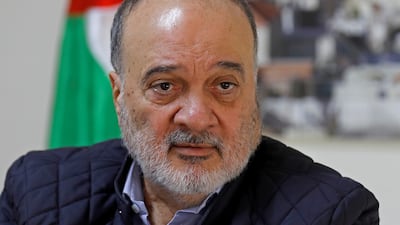One of the reasons why violence is surging in the occupied West Bank is that young Palestinians are losing faith in their political leaders and turning instead to what they see as the armed resistance against Israel, a former Palestinian foreign minister has said.
Nasser Al Kidwa, who is a nephew of the late Palestinian leader Yasser Arafat, spoke to The National on Friday, on the sidelines of an event held in Abu Dhabi by the Anwar Gargash Diplomacy Academy (AGDA).
"Part of it is a product of loss of faith in the so-called leadership and in the so-called peace process and future generally," Mr Al Kidwa said.
There have been no Israeli-Palestinian peace talks in nearly a decade and the last Palestinian election was in 2006.
"When the youth don't have the necessary answers, they tend to act in an extreme way, as we saw in Nablus and Jenin and other places," he said.
On Thursday, Israeli forces killed at least four Palestinians in separate incidents, including one who had stabbed a police officer in east Jerusalem and three others in Israeli raids in the occupied West Bank.
The raids and clashes between Israeli forcers and armed Palestinians have made 2022 one of the bloodiest years in the conflict's recent history. October was the deadliest month with at least 29 Palestinians killed by Israeli fire.

Mr Al Kidwa said he was not hopeful that recent "honest and sincere" efforts in Algiers to reconcile the rival Hamas and Fatah Palestinian factions last month would lead to a political breakthrough.
"The basic elements and reasons for the division are still there," he said. "I don't see the political determination to change the situation and I don't see a comprehensive vision in terms of how we can change that situation. Thus, I think we're going nowhere."
The division between Palestinian factions, triggered after Hamas won a legislative election in 2006, has prevented any further elections since then.
The Islamist group, which opposes peace with Israel, seized control of the Gaza Strip in 2007, while Mr Abbas's western-backed Palestinian Authority remained dominant in the West Bank.
Mr Al Kidwa said he was unofficially exiled from Fatah for criticising party head and Palestinian President Mahmoud Abbas. He then joined forces with imprisoned political leader Marwan Al Barghouti when Mr Abbas announced legislative and presidential elections last year.
Fatah was rating poorly in polls when Mr Abbas suspended the vote, citing the Israeli refusal to allow ballots to be cast in occupied east Jerusalem
Mr Al Kidwa said he was not surprised when the elections were postponed.
"The only source of legitimacy for the Palestinian side is the ballot box. Gone are the days of revolutionary legitimacy or family legitimacy. Anyone who would want to lead the Palestinian people would have to go this path," he insisted.
As the internal divisions continue, Mr Al Kidwa has little expectation for external support.
"I do not expect that any party will take the efforts and initiatives to support the Palestinian side unless we take care of our own internal situation and we're in a better position and we're more capable of doing things," he said.
"No one will volunteer because that's the nature of the world. Nobody volunteers to do anything for free."


